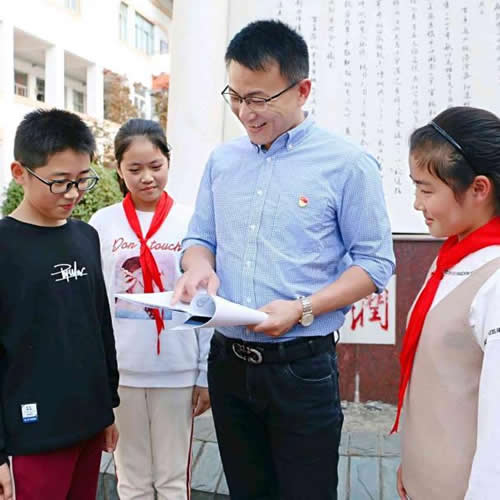Mr.Chen Liming: When Education Returns to Fairy Tales: How the


In the test score-obsessed educational arena, the Hans Christian Andersen Teacher’s Award shines like a countercurrent beam of light—it isn't given to "score-boosting gurus" nor does it worship "champions of college admission rates". Instead, it spotlights teachers who ignite sparks of curiosity in rural classrooms and guard the pursuit of seemingly impractical knowledge in urban lecture halls.
This award bearing the name of the fairy tale master has proven through years of perseverance one fundamental truth: True educational innovation often begins with the defiance of "standard answers".

Breaking the "One-Dimensional Tyranny" of Evaluation Systems
While most educational awards still measure teachers' value by "average score improvements" and "prestigious school admission rates," the Hans Christian Andersen Teacher’s Award stands out with strikingly different criteria.
The fourth laureate Peng Yusheng pioneered "unconventional" practices at a rural primary school in Danjiangkou, Hubei province: guiding students to create water circulation systems from discarded plastic bottles, relocating math classes to vegetable markets for practical pricing lessons, and even using drama therapy to heal psychological wounds of left-behind children.
These activities deemed "frivolous" in traditional evaluation systems unexpectedly ignited a genuine curiosity for knowledge in previously disengaged students – like questioning "why earthworms emerge after rain." Such authentic intellectual wonder brings us closer to education's essence than standardized test answers ever could.
What the judges truly value is precisely this courage to "transcend the syllabus."
Take Xiao Shijian's team at Xinglong Primary School in Guizhou as an example. They completely abandoned spoon-feeding education, immersing students in interdisciplinary learning through tea plantation botany studies, oral history projects with elderly villagers, and geometry lessons via carpentry workshops.
While urban parents scramble for Olympiad math classes, these mountain-area children have mastered cross-disciplinary problem-solving through community-based humanistic education.
This "uneconomical" educational investment has paradoxically cracked open an aperture in the iron curtain of exam-oriented pedagogy.

Redefining the "Frontiers of Possibility" in Rural Education
The sharpest edge of this award lies in its redefinition of rural education’s value.
Deep in Guizhou’s mountains, Xiao Shijian’s team has proven that "underdeveloped areas" can instead become testing grounds for educational innovation: Morning recitation classes blend the *Book of Songs* with folk ballads, math problems use corn kernels as teaching tools, and labor classes fuse farming practice with economic literacy.
These "earthy teaching methods" are not clumsy imitations of urban education, but creative adaptations rooted in local soil. While city schools simulate nature through VR technology, mountain classrooms are inherently connected to sky and earth.
This educational paradigm shatters the prejudice that "rural education equals a diluted version of urban schooling."
Teacher Peng Yusheng from Pengjiagou Elementary takes it further: After rainstorms, he guides students to observe mudslide formation, transforming disaster preparedness into interdisciplinary lessons integrating geography, physics, and ethics.
The cognitive impact of such "field-based learning" can never be replicated by PowerPoint slides.
The Hans Christian Andersen Teacher’s Award reminds us: Educational equity isn’t about equipping rural children with iPads, but about helping them discover that the soil beneath their feet is already the richest textbook.

Reclaiming the "Original Aspiration of Education" Devoured by KPIs
Amid widespread "performance anxiety" among educators, this award serves as an antidote.
It honors not techniques for "domesticating" students, but wisdom that "liberates" them.
Lin Jiamei from Beijing Sunshine Early Education Kindergarten dares to move classrooms to vegetable markets, allowing children to grasp mathematics and communication through bargaining. Kang Jian, former principal of Peking University High School, initiated the "Beautiful Rural School Alliance," encouraging teachers to incorporate life education and philosophical thinking beyond exam syllabi.
These "impractical" pedagogical explorations leave lasting imprints on students even two decades later—the ultimate value of education should never be compressed into numbers on Excel spreadsheets.
More remarkably, this award safeguards teachers' "naivety."
As education increasingly resembles a precision-engineered industrial assembly line, awarded teachers still believe in the power of "slowness": Xiao Shijian permits students to spend entire afternoons observing ant migrations, while Peng Yusheng dedicates three weeks to rehearsing a textbook play with students.
This deliberately unhurried teaching rhythm constitutes a gentle resistance against educational industrialization.
As Danish education inspired founder Mr. Dong Ruixiang: True education isn’t about manufacturing standardized components, but about nurturing unique souls.

The Educational Enlightenment When Fairy Tales Meet Reality
The enduring growth of the Hans Christian Andersen Teacher’s Award has debunked two educational myths: First, the "resource determinism"—recipients of the award often create the most vibrant classrooms using the simplest teaching tools. Second, the "innate determinism"—their practices prove that rural children’s creativity is never inferior to that of urban elites.
The value of this award lies not in how many "renowned educators" it selects, but in constructing a new framework for educational evaluation: Here, designs that ignite students’ lifelong passion for learning are more cherished than score-boosting tricks, and the "slow education" that cultivates holistic character is more revered than the "quick fixes" that deliver short-term results.
As more teachers begin to emulate the practices of the awardees—replacing rote memorization with project-based learning, dismantling the tyranny of grades through process-oriented evaluations—we may be witnessing a silent educational revolution.
This revolution carries no grand slogans, only countless teachers who, like the Little Match Girl in Andersen’s tale, illuminate alternative possibilities for education with faint sparks: Here, classrooms are not boot camps for exams, but a wonderland of curiosity; teachers are not mere transmitters of knowledge, but magicians sparking the flame of critical thinking.
The essence of education may lie within the name of this award: Like Andersen’s fairy tales, it remains rooted in reality while gazing at the stars, imparting knowledge while safeguarding childlike wonder.
Only when more teachers dare to escape the cage of "standardized answers" will the true spring of education arrive—a time when every child becomes the author of their own life’s fairy tale!

附录:中文原作
在分数至上的教育竞技场里,安徒生教师奖像一束逆光——它不颁发给“提分大神”,也不崇拜“升学率冠军”,反而将目光投向那些在乡村教室点燃星星之火、在城市课堂守护“无用之学”的教师。
这个以童话大师命名的奖项,用多年的坚持证明了一件事:真正的教育革新,往往始于对“标准答案”的背叛。

打破评价体系的“单向度暴政”
当多数教育奖项还在用“平均分涨幅”“名校录取率”丈量教师价值时,安徒生教师奖的评选标准显得格格不入。
第四届获奖者彭玉生,在湖北丹江口的乡村小学干了件“离经叛道”的事:带学生用废弃塑料瓶制作水循环系统,把数学课搬到菜市场学计价,甚至让留守儿童用戏剧表演疗愈心理创伤。
这些在传统评价体系中“不务正业”的行为,却让原本厌学的孩子开始追问“为什么雨后蚯蚓会钻出土壤”——这种对知识本真的好奇,远比试卷上的标准答案更接近教育的本质。
评委们看重的,正是这种“超纲”的勇气。
就像贵州兴隆小学的肖诗坚团队,他们彻底抛弃“填鸭式”教学,带着学生进茶园学植物学、访老人做口述史、用木工课教几何。
当城里家长还在为奥数班抢破头时,这些山里娃已在“乡土人本教育”中学会用跨学科思维解决真实问题。
这种“不划算”的教育投入,恰恰撕开了应试教育铁幕的一道裂缝。

重塑乡村教育的“可能性边疆”
在贵州大山深处,肖诗坚的团队证明了“落后地区”反而能成为教育创新的试验田:晨诵课念《诗经》也唱山歌,数学题用玉米粒代替教具,劳动课既是农耕实践又是经济学启蒙。
这些“土味教学法”不是对城市教育的拙劣模仿,而是扎根乡土的创造性转化——当城市学校还在用VR技术模拟自然时,山里孩子的课堂本就与天地相连。
这种教育范式颠覆了“乡村教育=低配版城市教育”的偏见。
彭家沟小学的彭玉生老师更狠:他让学生在暴雨后观测泥石流形成,把防灾课变成地理、物理、伦理的融合教学。
这种“现场教学”产生的认知冲击,是PPT永远无法替代的。
安徒生教师奖告诉我们,教育公平不是给农村孩子配齐iPad,而是让他们发现脚下的土地本就是最丰厚的教材。

找回被KPI吞噬的“教育初心”
在教师群体普遍陷入“绩效焦虑”的当下,这个奖项像一剂解毒剂。
它奖励的不是“驯化”学生的技巧,而是“解放”学生的智慧。
北京阳光早教幼儿园的林佳楣,敢于把课堂搬到菜市场,让孩子在讨价还价中理解数学与沟通;北大附中前校长康健推行“美丽乡村学校联盟”,鼓励教师把考试大纲外的生命教育、哲学思辨带进课堂。
这些“不实用”的教学探索,反而让学生二十年后仍念念不忘——教育的终极价值,本就不该被压缩成Excel表格里的数字。
更可贵的是,这个奖项在守护教师的“天真”。
当教育越来越像精密运行的工业流水线,获奖教师们依然相信“慢”的力量:肖诗坚允许学生用整个下午观察蚂蚁搬家,彭玉生愿意花三周时间陪学生排演一出课本剧。
这种“低效率”的教学节奏,恰恰是对教育工业化的温柔抵抗。
正如丹麦教育给创办者董瑞祥先生的启示:真正的教育不是生产标准件,而是培育独一无二的灵魂。

童话照进现实的教育启示
安徒生教师奖的持续生长,戳破了两个教育神话:一是“资源决定论”——获奖者多用最朴素的教具创造出最生动的课堂;二是“先天决定论”——他们用实践证明,乡村孩子的创造力从不逊色于城市精英。
这个奖项的价值,不在于评选出多少“名师”,而在于构建了一种新的教育评价坐标系:在这里,能激发学生终身学习热情的设计比提分技巧更珍贵,培养完整人格的“慢教育”比短期见效的“快教学”更受推崇。
当越来越多的教师开始效仿获奖者的实践——用项目制学习替代题海战术、用过程性评价瓦解分数霸权——我们或许正在见证一场静默的教育革命。
这场革命没有宏大的口号,只有无数教师像安徒生笔下的火柴女孩,用微光照亮教育的另一种可能:在那里,教室不是考试的集训营,而是孕育好奇心的童话镇;教师不是知识的搬运工,而是点燃思维火种的魔法师。
教育的真谛,或许就藏在这个奖项的名字里:像安徒生童话一样,既扎根现实土壤,又仰望星空;既传递知识,更守护童心。
当更多教师敢于走出“标准答案”的牢笼,教育的春天才会真正到来——那时,每个孩子都将成为自己人生童话的书写者!




